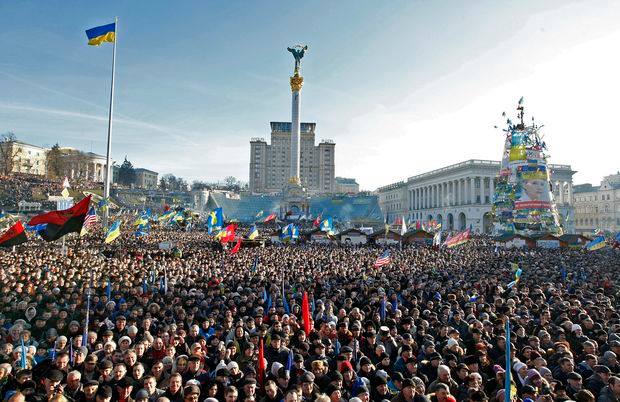1. None of 8 myths in Putin’s ‘Crimea is Ours’ ideology stands up to close examination, Popov says
2. Moscow’s claims of ‘historic right’ to Crimea don’t stand up, Popov says
3. Popov demolishes third ‘KrymNash’ myth – that Crimean people freely expressed their will
Moscow historian Arkady Popov has been systematically examining and demolishing the eight myths Vladimir Putin and his regime have put forward in justification of the Russian Anschluss of Crime. In “Yezhednevny zhurnal,” he takes on the fourth one: that Moscow had “an extreme need” to take Crimea away from Ukraine.
Popov writes that Moscow’s KrymNash enthusiasts from Putin on down have offered such “a multitude of justifications for the seizure of Crimea” that is difficult to avoid the suspicion that many of them are simply being put out without much confidence that anyone will believe them.
But there are two claims, which continue to be offered as explanations for why Moscow had to act and which have to be examined: that ethnic Russian residents in Crimea were threatened with a genocide and that if Moscow did nothing, NATO would put bases in Crimea. Neither of these notions stands up, Popov says.
During the 23 years of Ukrainian independence, he points out, “none of the ethnic Russian Crimeans had been subjected to genocide” or was likely to be. Yes, there had been tensions, especially in the immediate post-Soviet period, but none of them rise to the status of genocide.
Moreover, the ethnic Russians there did not complain about genocide; and “after 1994-1996, the level of support for pro-Russian organizations [in Crimea] was already not high.” For example, in 1994, there were 55 pro-Russian deputies in the 100-member Crimean Supreme Soviet; but by 2010, there remained only three.
Moreover, Popov notes, according to polls, “already in 2006, 74 percent of the residents of Crimea acknowledged Ukraine as their fatherland.” That figure fell to 40 percent after the orange revolution in 2008; but it fell not just among ethnic Russian residents of Crimea but among others as well, an indication that this was not a “Russian” issue.
Moreover, Popov continues, by 2011, the share of Crimean residents who viewed Ukraine as their fatherland had again “risen to 71 percent,” hardly an indication of the presence or fear of genocide by ethnic Russians there.
And such a pattern casts doubt on the veracity of Putin when he asserts that some “’closed poll’” taken before the Anschluss showed that “75 percent of the population of Crimea supported unification with Russia.” No one knows, Popov says, “what kind of a poll this was, who conducted it, and how correctly.”
Moreover, Russians there could have few complaints about Russian-language education: the use of Russian dominated the scene; and those who could have and did sometimes have complaints about the languages used in the schools were the Ukrainians and the Crimean Tatars who had been marginalized even then, Popov says.
There was one language issue that Russians might have been concerned about, the historian continues. Ukrainian law requires subtitles in Ukrainian for any film shown in Ukraine. But “does this mean that ‘the little green men’ arrived in Crimea to save Russian movie goers from Ukrainian subtitles?”
Moscow propagandists also like to claim that Russians and Russian institutions were threatened after the Maidan by “Right Sector” activists. But their numbers in Crimea were so small that they could not have threatened anyone, let along Russian institutions like the Black Sea Naval Fleet. Nonetheless, this has been a constant theme of the Krymnashists.
The other danger that they invoke to justify Russia’s intervention and occupation is the likelihood in their view that if Moscow didn’t move, there would soon be a NATO base in Crimea. The American reaction to Ukrainian events show how improbable that is now or at any time in the future, Popov argues.
Such suggestions, he points out, are an exact repetition of what Soviet propagandists said to justify the crushing of the Prague Spring in 1968: “If we don’t go into Prague today, tomorrow there will be German forces from NATO.” That argument was absurd then; it is equally absurd in the case of Crimea.
And it ignores something else, Popov says. “Thanks to the military intervention of Russia in Ukraine, the North Atlantic alliance has gotten a second wind: special NATO rapid reaction forces are being created, the military presence of NATO in the Baltic region and in other countries of Eastern Europe is expanding.”
In addition, “the Scandinavian countries have accused Russia of being the chief security threat in the region and have taken decisions to coordinate their defense policies in respond to this threat,” Popov says, even including Sweden and Finland which are not members of the alliance.
Was this why Russia needed to occupy Crimea, to restore an alliance of “all its neighbors against Russia?” Unfortunately, that is what has happened.
The “real motives” for Moscow’s actions, he says, lie elsewhere. They involve a desire in the Kremlin to provoke nationalism at home and to set the stage for occupying all or most of Ukraine. Indeed, he concludes, “the various ‘Crimean’ myths are connected” directly with the invasion of the Donbas and “the ‘continuation’ of the new political course of the Kremlin.”
1. None of 8 myths in Putin’s ‘Crimea is Ours‘ ideology stands up to close examination, Popov says
2. Moscow’s claims of ‘historic right’ to Crimea don’t stand up, Popov says
3. Popov demolishes third ‘KrymNash’ myth – that Crimean people freely expressed their will
4. Fourth Putin myth about Crimean Anschluss without foundation, Popov says
5. Fifth myth of Krymnashism – Ukrainian statehood is ‘artificial’ – demolished by Popov
6. Popov demolishes sixth Krymnash myth of ‘Fascist Euromaidan’
7. Seventh KrymNash myth — that annexation was a response to West’s denigration of Russia — baseless, Popov says
8. Popov demolishes last KrymNash myth — that Crimean Anschluss hasn’t cost Russia anything






